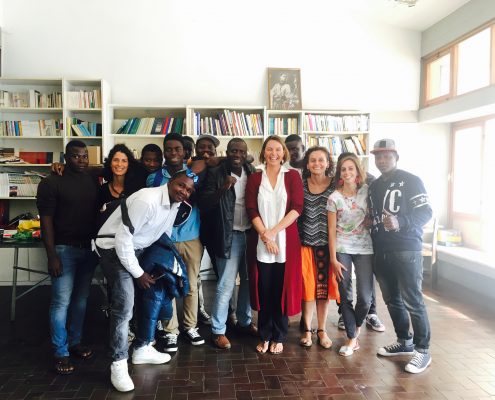‘Divieto dare da Mangiare’: Migrant Angst and Policing the Edible in Italy
“[Ventimiglia community members and activists came to the train station to offer free meals, but didn’t clean up]; so, to other people who went to the station maybe it seemed like a disaster zone, a dump. But, the mayor’s solution is a sham because you cannot ban human solidarity. You are seizing rights you do not have. You [can’t say] that I cannot offer solidarity to another person. It doesn’t work that way. So, yes, it is true that [feeding people street side] became a problem, but this solution is a sham. There are many other solutions [including formally organized meals or using certified kitchens].”
~C. Papini, Coordinator of Programs & Services, Caritas Ventimiglia, (translated interview with the author August 21, 2017)
“Before being arrested [in Nice] I was not active with migrants or any charity or organization. Now I am involved in helping migrants, and also in helping to organize [community responses…] to defend the rights of asylum [seekers]—to defend in solidarity—and [to] defend the people who are in trouble for having helping migrants.”
~Pierre Alain Mannoni, (interview with the author September 5, 2017)

Author Rachel Vaughn (in red sweater, center) with members of La Cooperativa Il Cammino in Pontedera, Italy.
In 2015, Ventimiglia mayor Enrico Ioculano signed l’ordinanza di divieto da dare da mangiare ai migranti— a municipal ban on serving food to refugees in the streets or camped along the rocky beaches of the French-Italian seaside town. According to interviews and newspaper accounts, the mayor’s ban was a means of addressing food safety, waste and pest control concerns. As the above interview quotations suggest, aid groups and activists, however, immediately resisted the ordinance, taking to the media, streets, kitchens and radio waves to protest what they see as the use of food as a weapon of exclusion. By 2017 just across the border, French activists Cedric Herrou and Pierre-Alain Mannoni faced fines, trial and charges for offering solidarities of food, shelter and safe passage. Legal scholar, human rights activist and director of l’Associazione Antigone Patrizio Gonnella adamantly spoke against the ordinance to La Corriere della Sera, arguing that banning acts of human solidarity was inhumane. The ordinance certainly reflects concern over municipal resource strain, as well as broader national asylum processing influx effecting Italy as a main port of arrival—a requirement of the Dublin Regulation, which establishes the first port of entry as rightful evaluator of claims from new arrivals to Europe regardless of an arrivee’s destination or desire to remain. Yet, Ventimiglia’s ordinance likewise reveals complex racialized and gendered tensions especially concerning African and Middle Eastern migration to Italy and across the EU; and for some, stands in stark contrast to, if not directly sparking, the humanism of other aid projects in Ventimiglia and beyond.
Thanks to a generous faculty summer research grant through the UCLA Center for the Study of Women, this new oral history project examines various roles of food and water in processes of asylum in Italy. Though I have been researching complex transnational tensions surrounding this particular municipal ban (and its May 2017 revocation) since Spring 2015 this unique oral history work formally began Summer 2017 as I conducted the first interviews and site visits. The call for participants is open and continuous, regardless of political affiliations, humanitarian aid or citizenship status. My broader interdisciplinary book project on the topic weaves together the interview data with legal, population, media and popular culture sources to analyze Italian asylum more extensively through the dual lens of the edible and the necropolitical—in other words, the politics of death, dying, the wasted or cast aside. I center my attention on the racialized and gendered political meaning-making happening through eating. Melding Kyla Wazana Tompkins’ conceptualization of “critical eating studies” which critiques “the political beliefs and structures that underlie eating as social practice” with waste scholar Michelle Yate’s Marxist feminist Human-as-Waste, and UCLA Gender Studies scholar Grace Hong’s work on necropolitics revealing, “power that affirms [difference] yet levies death and destruction to poor, racialized [or] sexually ‘deviant’ populations;” my research centers edible tensions in Italy’s migration ‘crisis.’
Dr. Rachel Vaughn is Assistant Adjunct Professor in the UCLA Center for the Study of Women, Institute for Society & Genetics, and Gender Studies Department. She holds a PhD in American Studies from the University of Kansas. Her research engages the intersections of Critical Food and Discard Studies, Feminist Science & Technology and Environmental Studies. She is the author of “‘Choosing Wisely’: Paralleling Food Sovereignty and Reproductive Justice” (Frontiers); co-editor and organizer of Edible Feminisms: On Discard, Waste & Metabolism a UCLA Luskin Endowment grant-funded conference and special issue of Food, Culture & Society. Vaughn’s forthcoming book is Talking Food, Talking Trash: Oral Histories of Food Precarity from the Margins of a Dumpster (University of Nebraska Press). She is author of a second manuscript-in-progress Queer Toxic Soy & Estrogen Panic: Gendered Food Fear Mongering.

